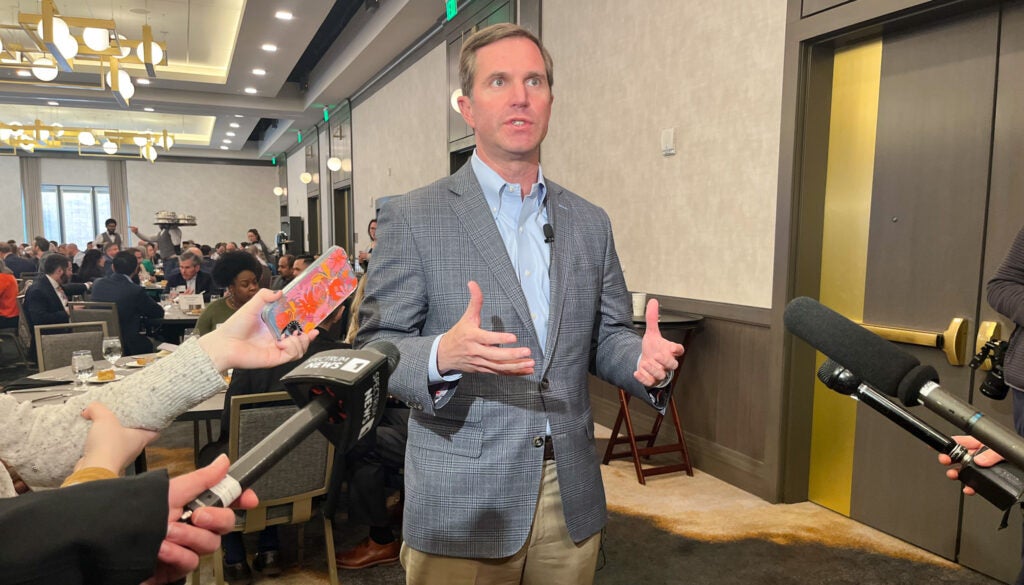‘Power grab,’ says Beshear of bill to move Fish and Wildlife to agriculture department
Published 3:45 pm Tuesday, March 19, 2024

- Gov. Andy Beshear speaks to reporters in Louisville before addressing a luncheon hosted by Greater Louisville, Inc. (Kentucky Lantern photo by McKenna Horsley)
Kentucky Lantern
By Mckenna Horsley
Democratic Gov. Andy Beshear on Monday called a Republican-backed bill that would move the state’s wildlife management agency from his administration to the agriculture department an unconstitutional “power grab.”
Beshear also called out Senate Republicans for refusing to confirm his appointees to the Fish and Wildlife Commission.
“It’s time for them to stop protecting leadership of what I think is the most corrupt part of state government,” the governor told reporters before speaking at a luncheon in Louisville.
Beshear said he chooses his appointees for Fish and Wildlife commissioners from a pool of five candidates nominated by sportspeople who vote at nine district meetings.
The Senate “has refused to confirm them over and over,” Beshear said.
The nine-member commission has three vacancies.
Controversy surrounded the appointment of Rich Storm as commissioner of the Kentucky Department of Fish and Wildlife Resources (KDRFW). Then-Attorney General Daniel Cameron issued an opinion in 2021 saying the commission had violated the open meetings law when hiring Storm. A group of sportspeople sued Fish and Wildlife for access to texts and emails related to Storm’s contract renewal. The case is awaiting a state Supreme Court ruling.
In a narrow Friday vote, the Senate passed Senate Bill 3, which would move the Kentucky Department of Fish and Wildlife Resources from the tourism cabinet, which is part of Beshear’s administration, to the Kentucky Department of Agriculture, which is overseen by elected Republican Agriculture Commissioner Jonathan Shell.
The Kentucky Horse Racing Commission would be moved from the Public Protection Cabinet to the agriculture department, under a floor amendment added to the bill by Senate Republican Floor Leader Damon Thayer, of Georgetown.
The bill is awaiting House action.
Speaking with reporters on Monday ahead of a Capitol Connection luncheon hosted by Greater Louisville, Inc., Beshear chalked up the move to partisan politics. He pointed to a recent Court of Appeals decision that found a law giving the majority of the Kentucky State Fair Board appointments to the agriculture commissioner instead of the governor was unconstitutional. The bill is part of a legislative trend to limit gubernatorial authority.
“I mean, knock it off, all right? People don’t want this constant back and forth. I’m trying to serve all the people of Kentucky,” Beshear said. “This is simply because I’m a Democrat and they’re Republicans, and that’s not how we should govern.”
In his remarks to the crowd, which included local business leaders, the governor renewed his call for more public education funding, universal pre-kindergarten and economic development.
He also voiced support for diversity, equity and inclusion initiatives, which are under fire from the Republican-controlled legislature.
“It’s got to stop,” Beshear said. “It’s tearing our country apart, the type of anger and hate politics we see out there. The need to create a boogeyman every session which is normally a three-letter acronym they try to turn into a four-letter word.”
What is Beshear reviewing?
Last week, the House and Senate moved several GOP priority bills, including an omnibus crime bill that won approval in the House and Senate, House Bill 5. Beshear told reporters while he hasn’t reviewed the latest version of the bill, he is supportive of parts of the legislation, such as a carjacking statute, but is concerned about other provisions, such as how creating the crime of illegal street camping could affect people who are homeless.
“I’m going to look very carefully over it when we get it,” Beshear said. “At the end of the day, we want to make sure that our communities are truly safer based on any legislation we pass.”
Beshear also raised concerns about an increase in corrections costs if HB 5 becomes law. According to an analysis by progressive think tank the Kentucky Center for Economic Policy, the legislation would cost more than $1 billion over the next decade because of an increase in incarceration expenses.
“If they’re going to ask the executive branch to house more inmates, they’re going to need to provide the funding to do it,” the governor said.
As Beshear spoke in Louisville, members of Senate and House leadership met in a conference committee at the Capitol to reconcile differences between their proposed budgets. The governor said he was more supportive of the Senate’s version, as it restores “necessary dollars to Medicaid and a number of other programs.” Some of the things he had proposed in his budget, like dollars to renovate career and technical education facilities in high schools, were included in the Senate budget.
Beshear did however lament what he sees as inadequate funding for public education needs the the House and Senate budgets.
“We cannot have a state budget unless it includes raises for our public school educators and at least strongly considers universal pre-K,” he said.
Ensuring universal pre-K is essential to addressing the need for child care, the governor said. Beshear has proposed spending $141 million over the next two years to stabilize the child care industry in his budget. He also asked the state to spend $172 million to begin funding universal preschool for Kentucky four-year-olds, though child care advocates worried his plan could cannibalize the child care industry since most providers don’t start making money on students until they reach three and four years old.
The Senate did not propose enough to stabilize the industry this year as COVID-era federal dollars dry up, child care advocates have said.
Meanwhile, Republican Sen. Danny Carroll, of Benton, proposed $300 million on child care, including a $66 million annual investment into the Child Care Assistance Program, which helps families pay for expensive child care tuition.
The General Assembly has eight days left in its current 60-day session. The House and Senate will reconvene Thursday, but committees will meet at the Capitol before then. Lawmakers will recess for the 10-day veto period starting next Friday, March 29.
The two-term governor’s vetoes have been futile because the Republican supermajority in the General Assembly can easily override them. For the most part, they do highlight differences in policy priorities between Democrats and Republicans. So far, Beshear has issued one veto against a bill that preempts local bans on housing discrimination based on the renter’s source of income. The General Assembly already overrode it.
Constitutional amendment
One piece of legislation that Beshear will not be able to veto or sign is a bill that puts a constitutional amendment on the ballot to allow the General Assembly the ability to give public dollars to nonpublic schools. The House and Senate approved the amendment last week, paving the way for a November election. Constitutional amendments are decided by Kentucky voters and not sent to the governor.
Beshear said he is “fully and entirely” opposed to the constitutional amendment. He said the General Assembly has been underfunding public schools for decades.
“Basically they starve our public schools and the resources they need, and then argue our public schools aren’t succeeding,” Beshear said. “Well, if you want to fix public schools, provide them the money that will help with that fix.”






